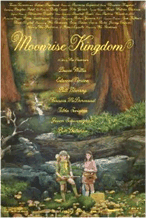Original unique whole-family classic to be _ 9/10
Review by Brian Wright
Suzy: These are my books. I like stories with magic powers in them. Either in kingdoms on Earth or on foreign planets. Usually I prefer a girl hero, but not always.
Wes Anderson, who loaded the bases thanks to quirky hits Rushmore (1998) The Royal Tenenbaums (2001), and The Life Aquatic with Steve Zissou (2004) hits a home run with Moonrise Kingdom. Or at least a triple… which is more in keeping with the quixotic ‘oddballness’ that characterizes the Anderson movies this reviewer has seen. Moonrise‘s attraction for me—aside from the humor that I sometimes wonder if I’m smart enough to see—lies in its 1965 all-American familial setting: like Norman Rockwell seen through the eyes of Clem Kadiddlehopper.
Directed by Wes Anderson
Written by Wes Anderson, Roman Coppola
Kara Hayward … Suzy
Jared Gilman … Sam
Bruce Willis … Captain Sharp
Edward Norton … Scout Master Ward
Bill Murray … Walt Bishop
Jason Schwartzman … Cousin Ben
Tilda Swinton … Social Services
Frances McDormand … Laura Bishop
Harvey Keitel … Commander Pierce
Naturally I don’t want to give away the too much of the story, but let me at least set it up for you. This is a boy meets girl movie, like truly boy and truly girl, each somewhere in the early part of puberty. The enchanting part of Moonrise and other Anderson films is how the main characters live in their own private Idahos… in fact, the less-than-main characters often occupy private quixotic worlds as well. Sam (Jared Gilman) is the boy, an orphan who partially compensates by belonging to a Boy Scout troop, this one run by true-believing, overly regimented Scout Master Ward (Ed Norton).
Ward is like a foster father to Sam, and shows his love for the boy by, well, doing what scoutmasters do: making sure the Scouting events run on time and exactly as they are supposed to, seeing to it that the scouts conform to the rules and regulations, and in all the tasks and competitions making the troop the best it can be. Norton’s performance is A1-certifiable: he’s a disciplinarian, but a boyishly sensitive one; you wish for him that reality and all the deep struggles of life could be handled by being devoted and precise. Sam appreciates his scoutmaster, but is far too individualistic to toe the line. He hatches a bold plan to break free.
That plan includes the object of his undying Big Love, a girl feeling trapped in a family parented by a couple of brainy, emotionally remote eccentrics, Walt and Laura Bishop (Bill Murray and Frances McDormand). Suzy is the perfect counterpart, or compatriot, to Sam. And watching the plot unfold as they hook up then depart from normal society is the quintessence of enchantment. Basically as the two starry-eyed young idealists learn the ropes of their new path, all hell breaks loose in the community, which treats them as VIP missing persons.
The film ingeniously, tenderly, inserts the viewer into the hearts and souls of both the precocious oddball children and the various townspeople… even the harsh statie social worker whose given name is simply Social Worker (Tilda Swinton). As for the way writer-director Wes Anderson creates his two young-teen protagonists, most of us in the audience, especially early Baby Boomers, will identify with the longings and anxieties we felt at those ages. [Though few of us will have made such bold moves toward stepping out.]
The other characters skillfully complement the Sam persona, not so much the Suzy. I’ve already mentioned Scout Master Ward, who has perhaps the most radical reaction to Sam’s leaving. Bruce Willis as Captain Sharp provides a most interesting connection to young Sam, and I recall speculation that Willis’ performance is Oscar-worthy. Who knows? This viewer certainly enjoys Willis’ interpretation of Captain Sharp—like Dudley Do-Right questioning the limitations of his life. There’s also a profound sensitive and caring quality that infuses the entire story, but especially as mediated through Willis’ character.
So is Moonrise a coming of age movie? Yes, because it deals with all the universals of the struggle to make it honestly, caringly from child to adult. But there’s more to the Anderson vision—and I do strongly appreciate this—which is, “It’s all right to be different, by golly, to deny consent to the Group Eternal, even as a child, especially as a child. Be way different… just so long as you act from compassion and your own vision.” In these recent days of copious mass production of children demonstrably without souls, extolling sublime individuality is more than a tonic to the spirit… and the reason I rate it a 9 vs. an 8.
A word about surroundings: I actually saw this movie at the theater, as it was my birthday (July 11) gift by a lady friend of mine. My friend is slightly hard of hearing, so she didn’t seem to mind the stadium-level decibels that started at the commercials and went thru the closing credits. But it overwhelmed me. To the point I’m probably not going to a live movie theater for the indefinite future—or at least not the megabox variety. I recognize the modern way of el chambre de cinema is to pound the eyes and blast the eardrums without respite (I keep looking forward to dialog sections in Moonrise but even those are dialed up mercilessly).
That’s fine, I’m looking forward to the second showing here on my once-upon-a-time-big  screen HDTV. It’s the sort of movie you tend to miss important parts of on a single showing, with or without rewind. Very good stuff. Academy, do the right thing in February.
screen HDTV. It’s the sort of movie you tend to miss important parts of on a single showing, with or without rewind. Very good stuff. Academy, do the right thing in February.
This post has been read 2400 times!



